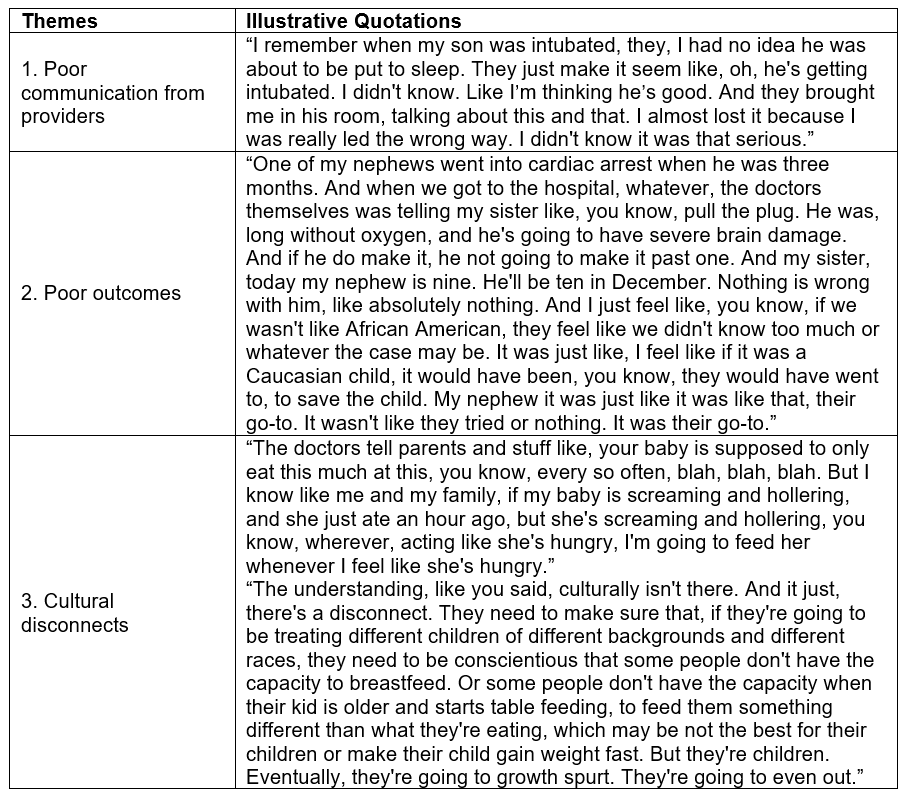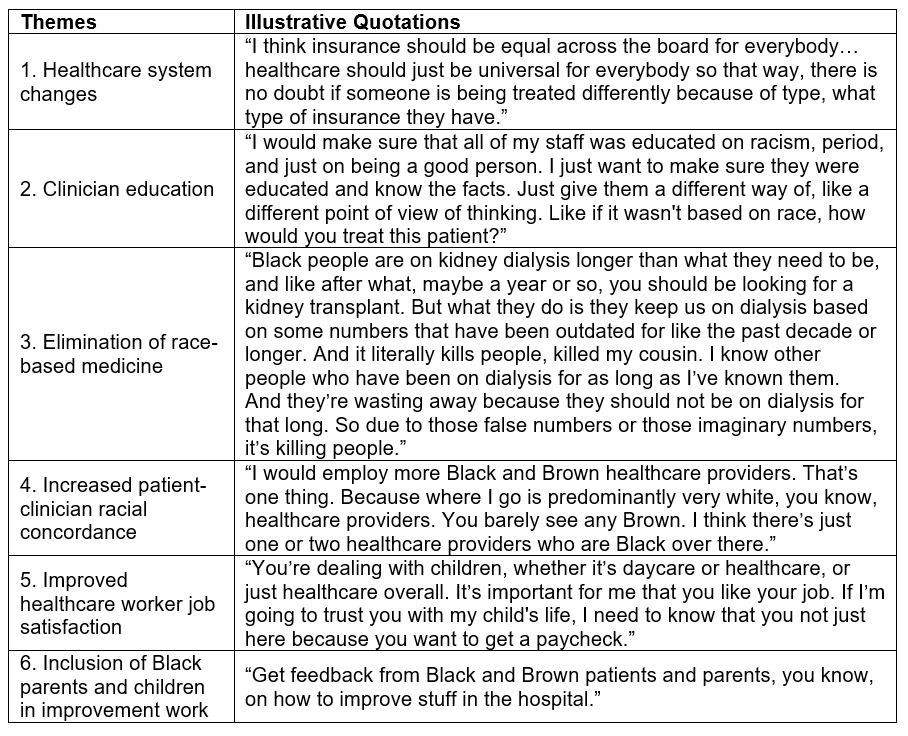Health Equity/Social Determinants of Health
Health Equity/Social Determinants of Health 3
541 - Black Parents’ Experiences of Racism in Pediatric Healthcare Settings and Ideas for Improvement
Friday, April 28, 2023
5:15 PM - 7:15 PM ET
Poster Number: 541
Publication Number: 541.118
Publication Number: 541.118
Margaret N. Jones, Cincinnati Children's Hospital Medical Center, Cincinnati, OH, United States; Kiaira Elliott, University of Cincinnati College of Medicine, Cincinnati, OH, United States; Susan N. Sherman, SNS RESEARCH, CINCINNATI, OH, United States; Ebunoluwa Falade, University of Cincinnati College of Medicine, Cincinnati, OH, United States; Lauren M. Lipps, Cincinnati Children's Hospital Medical Center, Cincinnati, OH, United States; Rolanda L.. Clark, Cincinnati Children's Hospital Medical Center, West Chester, OH, United States; Lenice Hill-Williams, Nour!shment, Cincinnati, OH, United States; Caneisha Williams, Children's Health, Cincinnati, OH, United States; Kristen A. Copeland, Cincinnati Children's, Cincinnati, OH, United States; Andrew F. Beck, Cincinnati Children's Hospital Medical Center, Cincinnati, OH, United States; Ndidi Unaka, Cincinnati Children's Hospital Medical Center, Cincinnati, OH, United States; Mary Burkhardt, Cincinnati Children's Hospital Medical Center, Cincinnati, OH, United States; Alexandra Corley, Cincinnati Children's Hospital Medical Center, Cincinnati, OH, United States

Margaret N. Jones, MD FAAP (she/her/hers)
Academic General Pediatrics Fellow
Cincinnati Children's Hospital Medical Center
Cincinnati, Ohio, United States
Presenting Author(s)
Background: Racism is a root cause of pervasive health inequities which negatively affect Black children. It is critical to understand the perspectives of Black parents to develop interventions and policies effective at preventing or mitigating the harmful impacts of racism on health outcomes.
Objective: We sought to understand and characterize the experience of racism in pediatric healthcare settings, and ideas for improvement, from the perspectives of Black parents.
Design/Methods: We conducted a qualitative study at a large, urban, freestanding children’s hospital located in Cincinnati, Ohio. We recruited Black parents and caregivers from our three academic primary care clinic sites. Our study team includes 3 Parent Advisors who identify as Black. We developed and modified an open-ended semi-structured interview guide. Focus groups were facilitated by Black team members. Follow-up probes were used to expand and clarify discussion. Virtual sessions, lasting 60-90 minutes, were recorded and transcribed verbatim. We analyzed focus group transcripts using iterative, thematic, inductive open coding performed independently by trained coders, with final codes reached by group consensus.
Results: We conducted 6 focus groups of 3-5 participants each and 1 individual interview, with 24 total participants. Black parents' experiences of racism in healthcare settings (Table 1) were categorized into the following themes: 1) poor communication from providers; 2) poor outcomes; and 3) cultural disconnects. Participants identified opportunities for improvement (Table 2) including: 1) healthcare system changes; 2) clinician education; 3) elimination of race-based medicine; 4) increased patient-clinician racial concordance; 5) improved healthcare worker job satisfaction; and 6) inclusion of Black parents and children in improvement work.
Conclusion(s): In this qualitative study, Black parents highlighted that experiencing racism in clinical settings was commonplace. Participants also identified opportunities for improvement, including the intentional inclusion of Black voices in policy development, an active increase of Black representation among physicians and healthcare workers and in the medical education provided to all trainees, equitable standardization of healthcare practices, and universal healthcare access. This work underscores the importance of elevating the voices of Black parents in developing institutional and public policies that prioritize antiracism and work to eliminate the harmful impacts of racism on child health.


